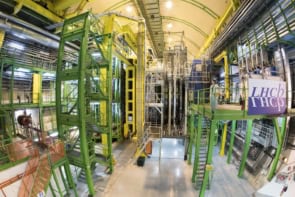
The US has slashed funding for the International Linear Collider (ILC) by 75 % as the budget for 2008 has been finally agreed between the Republican Bush Administration and Democratic Congress. The new budget legislation, which US president George W Bush is expected to sign by 31 December, will see up to 200 scientists at the Fermi National Accelerator Laboratory (Fermilab) lose their jobs. Funding for the international ITER fusion experiment, which is about to be built in France, has also been cut.
After 11 months of debate between the political parties, the budget compromise left the Department of Energy’s Office of Sciences, which funds much of American physics, with $4.02 bn for the financial year which began this October – a rise of 2.6 % compared to 2007 and $504 million below the Administration’s original request. “The appropriation falls so far short of the request that there will be painful cutbacks in laboratory plans,” says Kei Koizumi, a budget analyst at the American Association for the Advancement of Science.
Fusion hit hardest
High-energy physics will bear the brunt of the cuts, falling by 8.5 % to just $688 m. Research into nuclear fusion takes an even larger hit falling by 10.2 % to $287 m compared to last year .
The cuts, announced at extremely short notice, have immediate and significant impact at Fermilab. The lab learned to their astonishment that they will have just $310 m to spend this financial year from an expected $372 m. The budget process has even specified which Fermilab programmes will receive the bulk of the cuts – the most prominent being the 75 % cut for the ILC, which is set to be the next big experiment in particle physics after the Large Hadron Collider at CERN. Funding will fall from $60 million to just $15 million. But as Fermilab has spent roughly that much since the start of the financial year on the project, further spending on the ILC is effectively zero. Funding for the initial construction of the NOvA neutrino experiment at Fermilab has also been cut. “It’s a devastating blow,” said Fermilab’s director Pier Oddone.
Lay-offs and unpaid leave
Oddone moved fast to deal with the situation. At a meeting of the entire lab on 20 December, he announced that he would lay off 200 members of the 1,900-member Fermilab staff. Since severance payments will eat up some of the savings, Oddone announced that staff will have to take 2 days of unpaid leave per month. In making those decisions, Oddone has a two-fold goal: To ensure that the Tevatron accelerator continues to chase the Higgs boson until its scheduled closure in 2009, and to guarantee that Fermilab will continue to make significant contributions to elementary particle physics after that date. “We have a rugged plan to deliver results that matter,” says Fermilab spokesperson Judith Jackson.
The ILC is not the only international venture to suffer in the budget. The US contribution to the International Thermonuclear Experimental Reactor (ITER) also falls to zero compared with a requested amount of $160 million, although the budget includes $10.72 m for American R&D on the project. The budget document adds a warning that “funding may not be reprogrammed from other activities within Fusion Energy Sciences to restore the U.S. contribution to ITER.”
The effect on ITER’s progress may be relatively small. “I don’t expect much of a delay,” Koizumi says, “because the other international partners are paying for most of the construction, and it’s already facing some delays.” However, cutting ITER’s funding has one virtue: allowing three American fusion facilities – the DIII-D in San Diego, the Alcator C-Mod at the MIT plasma science and fusion center, and the National Spherical Torus Experiment at the Princeton Plasma Physics Laboratory, to be funded at close to their requested levels.
The new budget legislation has put American physicists into a grim mood. A year that started with great hope of increased funding is ending on a note of near despair coming just days after the UK announced that it plans to pull out of the ILC altogether.



